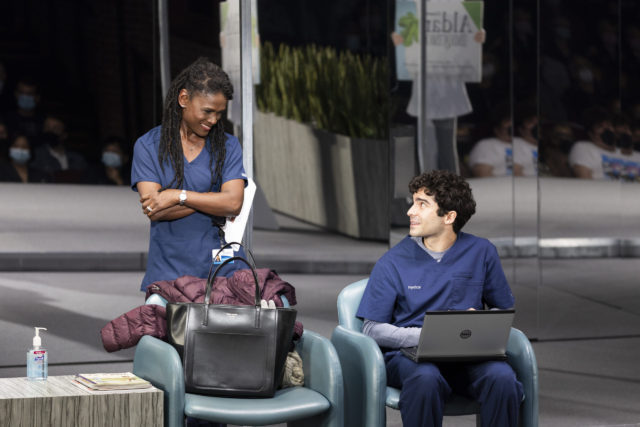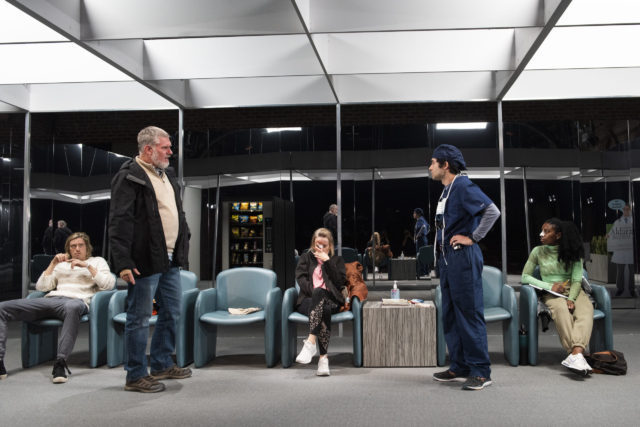
Patients and family members await serious news in Gracie Gardner’s I’m Revolting (photo by Ahron R. Foster)
I’M REVOLTING
Atlantic Theater Company
Linda Gross Theater
336 West 20th St. between Eighth & Ninth Aves.
Tuesday – Sunday through October 16, $77-$97
866-811-4111
atlantictheater.org
Theater is all about making magic, and that’s exactly what happened at last Sunday’s matinee of Gracie Gardner’s I’m Revolting at the Atlantic. The play takes place in the waiting room of a New York City skin cancer clinic, where four characters are arriving for further tests or surgeries. There’s no curtain, so Marsha Ginsberg’s attractive set is visible as the audience enters: six chairs lined in a row at the center, a watercooler stage right, some plants stage left, a vending machine behind the patients, low overhead fluorescent lighting (by Kate McGee) and a striking wall of mirrors across the back that allows the audience to see itself in the reflection, as if we are all in the waiting room together. The effect is all the more effective since masks are required at the Atlantic and we are about to see a show in which several characters must deal with possible facial disfigurements that would leave them trying to avoid mirrors.
But before the play started, director Knud Adams, taking off his mask, announced that one of the actors, the wonderful Peter Gerety, had come down with Covid-19 and was being replaced by the wonderful Peter Maloney, an Atlantic regular who had been asked the day before to step in for Gerety. Adams explained that Maloney would be playing the part with script in hand, since he had had less than twenty-four-hour notice. Understudies have performed their own kind of magic during the coronavirus crisis, keeping Broadway and off Broadway going amid variant outbreaks, but none are listed in the Playbill for I’m Revolting, so without Maloney, the last week of the show’s run might have had to be canceled.

Doctors Denise (Patrice Johnson Chevannes) and Jonathan (Bartley Booz) are in for a long day at skin cancer clinic (photo by Ahron R. Foster)
Maloney does a remarkable job as Clyde, an older man who has been to the clinic many times for multiple procedures; he is either a wise sage or a nosey neighbor to the others: nineteen-year-old Reggie (Alicia Pilgrim), who is terrified of being left with ugly facial scars; Reggie’s older sister, Anna (Gabby Beans), a demanding financier who seems to have better things to do than wait with her nervous sibling; Toby (Patrick Vaill) a former lifeguard who blames his nipple melanoma on himself for not using proper protection and hides under his coat instead of interacting with anyone; Paula (Laura Esterman), Toby’s New Age mother, who believes healing comes from within (with the help of holistic rituals); Liane (Emily Cass McDonnell), the saddest of them all, who has the most extreme case; and Jordan (Glenn Fitzgerald), her husband, who is in complete denial as to her wife’s situation.
The clinic is run by Denise (Patrice Johnson Chevannes), a calm, welcoming doctor, and Jonathan (Bartley Booz), a younger physician learning the ropes from her. Every time Denise or Jonathan call in a patient to go through the door in the back, the other people in the waiting room engage in a range of conversations, openly sharing their personal information with one another.
The cast is uniformly superb, keeping it real even when their characters go a little overboard. Pilgrim (Cullud Wattah) portrays Reggie in a way that she could be any of us, while Chevannes (Halfway Bitches Go Straight to Heaven, runboyrun) makes Denise the doctor you’d want to have for whatever ails you.

Jordan (Glenn Fitzgerald) and Jonathan (Bartley Booz) face off in I’m Revolting at the Atlantic (photo by Ahron R. Foster)
Clyde is the central guiding force, and Maloney (Outside Mullingar, Glengarry Glen Ross) nailed him; while he occasionally looked at the script (usually surreptitiously), he was mostly off book, getting his line readings just right with all the necessary ebbs and flows. It was inspiring to watch him pull this off, to both the audience and his fellow actors, a reminder for how real illness can be and as a model for how humans deal with it (although the general public cannot call in a replacement at the last minute).
Adams (English, Paris) directs the play with surgical precision, although things get bumpy when Gardner (Panopticon, Pussy Sludge) tries to conclude each patient’s story arc. The finale, though, is a sharp jab to the head and stomach. It’s not an easy ninety minutes, but Adams and Gardner do a terrific job of keeping you involved in a work that unfolds in one of the last places you’d ever want to be.